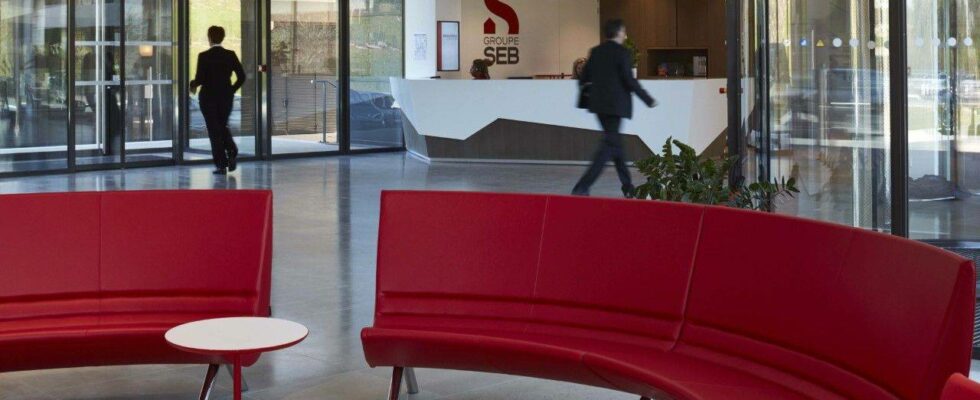(AOF) – The Seb group posted sales in 2023 up 0.6% to just over 8 billion euros and recorded organic growth of 5.3%, in line with the objective of the business. Over the whole year, Consumer sales amounted to 7.05 billion euros, organic growth of 3.2% compared to 2022, while Professional activity sales stood at 962 million euros, an organic increase of 26.5%, supported by the dynamism of the Professional Coffee activity, particularly in China, the United States and the United Kingdom.
In terms of prospects, the group “now expects an increase of at least 15% in its operating profit over the whole year” compared to at least 10% previously.
AOF – LEARN MORE
Key points
– World leader in small household appliances born in 1944 with a vast portfolio of brands (All-Clad, Curtis, Krups, Lagostina, Moulinex, Rowenta, Supor, T-Fal, WMF…), including 4 global, 17 regional, 3 high-end and 6 professional;
– Revenues of €8 billion distributed between Western Europe for 33%, China for 27%, the rest of Asia for 8% and the Americas for 17%;
– Historical activity in culinary items for 35%, behind small household appliances for 60%, diversification into professional products (8%) progressing rapidly;
– Business model favoring growth through brand complementarities and competitiveness through the manufacturing of high value-added products in mature countries and the use of the circular economy;
– Capital locked by the founding families (41.91% of the capital including 32.81% acting in concert), followed by the Strategic Participation Fund (4.74%) and Peugeot Invest (4%), the board of directors of 17 members being chaired by Thierry de La Tour d’Artaise, with Stanislas de Gramont providing general management;
–
Balance sheet under control with equity of €2.9 billion at the end of June compared to debt of €2.3 billion, i.e. a leverage of 2.7.
Challenges
– Strategy based on organic growth, international expansion aimed at leadership in countries, and competitiveness;
Innovation strategy:
– in industrial processes, to optimize technical platforms,
– in the offer, with 30% of turnover generated on products less than 18 months old and 3.5% of turnover devoted to R&D (filing of 436 patents),
– partnerships with public research centers and, for 5 to 10% of sales, with manufacturers with 7 areas of research – food, robotics, chemistry, physics, physiology, social sciences and information technologies,
– investment, via the Seb Alliance fund, in innovative companies in well-being, connectivity and sustainable development, with a focus on online sales,
– opening of a global innovation center in Ecully;
– Environmental strategy aiming for carbon neutrality in 2050 with 2 levers:
– industrial process: eco-design, logistics,
– circular revolution (reparability, recycling of materials, rental, second life), actions for customers and society (SEB funds);
– integration of ESG criteria into remuneration;
– Rise of digital (40% of sales), strengthening of information systems and strengthening of the logistics chain.
Challenges
– Sensitivity of the euro vs. the yuan, the real, the ruble, the Turkish lira and the dollar;
– Inflation of raw materials (5O% of turnover with 1/4 of production located in Europe), freight costs and supplies hit;
–
Integration of acquisitions – San Marco (espresso machines), Pacojet (emulsifying device) in the professional sector – and Forge Adour (planchas) in the general public;
– Confirmation of the rise in sales in key markets – Europe and China for the general public – and the dynamism of the professional division;
– Realization of conquest ambitions, with Krups, in Australia and New Zealand;
– After a recovery in turnover in 2
th
quarter, 2023 objectives raised: growth of 5% for sales and +10% for operating profit.
Learn more about the Consumer Goods sector
In France, financial aid aimed at encouraging consumers to repair rather than throw away objects now also applies to clothing and shoes.
The principle remains the same for clothing and shoes as for the selection of electronic products: the consumer must go to an approved repairer to benefit from assistance which cannot exceed 60% of the cost of the repair. The approved organization, “Refashion”, aims to increase the number of repairs by 35% by 2028. The Repair Fund, fueled by “eco-contributions” from brands, finances the operation. However, the question is whether this bonus will have to face the same difficulties as that for household appliances, which has not met with the expected success, in particular due to complex labeling procedures.
